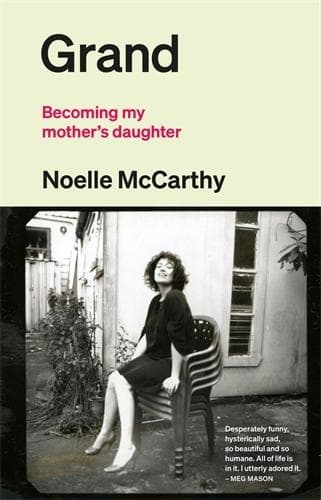Review: Grand: Becoming my mother’s daughter
Reviewed by Ruth Spencer
Noelle McCarthy’s favourite book is Dracula, the tale of a fascinating, dangerous entity, capable of eclipsing all others. Literally sucking out your life blood, yet the enthrallment remains. You want to let him take from you, even as you’re maimed, drained and changed. Noelle’s Mammy is the vampire of her life, inspiring love and admiration, hatred and fear in equal measures. A tiny pink-haired Irish woman, she looms as though swathed in the bat-like cape of gothic horror even as she shrinks and vanishes from this life.
McCarthy emerges from her memoir battle-stained yet triumphant having survived the great enemy, and greatest ally, of her life: her mother. She also emerges as a writer of unusual ability. Written as a beautifully structured series of remembered moments under the overarching narrative of her mother’s last illness, Grand’s delicately drawn characters and delightful phrasing read like a delicious novel.
McCarthy comes of age in ‘90s Cork, Ireland with a black velvet choker; falls into unexpected fame in the unstructured bFM studio; waitresses for celebrities vying to be noticed in the Prego courtyard.
McCarthy’s vibrant charm is so engaging, her turn of phrase so deft, that it all feels like time spent with a dazzling, funny best friend.
Carol, McCarthy’s mother, is an alcoholic, but that isn’t really what this book is about. McCarthy is sensitive to the many familial and cultural influences that push people towards their chosen oblivion and how abuse and misery in one generation is passed down to the next. A society that considers it a blessing when an unwed mother dies in childbirth can’t be surprised when survivors, met with a wall of judgment and silence, self-medicate with whatever is cheap at the off-licence.
That the buried pain and anger rise up sometimes when the dose has been too strong is inevitable. That the misery is visited on whoever is around at the time - usually the captive audience of her own children - is a given and the cycle renews. It takes immense strength and self-awareness to put a spoke in that evil wheel. McCarthy only occasionally alludes to the difficulty of maintaining sobriety after she stops drinking at 30 but it must be an ongoing feat of will. Like giving up alcohol, McCarthy knows she has to separate from Carol before the relationship that gave her life also kills her, first in her youth and then at the end; she has to say I love you and goodbye, whether or not she hears it in return.
McCarthy mentions that her friends will be disappointed to meet her Mammy. They’ll be expecting something out of Marian Keyes, Mammy Walsh in person, a hilarious cliché of chaotic Irish motherhood. That’s because McCarthy is an entertainer, spinning her pain into yarns. When we reach that bit we’re disappointed too – won’t she perform, this pink-haired harridan, this uncontrollable rogue? But she won’t. McCarthy has given us her highlights reel, the highs and lows of her intensity, but Carol’s not something out of a tragi-comic Mrs Brown’s Boys to dance drunkenly for us. Her damage and suspicion close her off from strangers, an angry, difficult presence at the party that sours the energy. A whole person, not a pantomime.
Grand is funny, clever, beautiful, sad. It’s more of a eulogy and less of a diatribe than it could have been. McCarthy protects her mother with gentleness and love in the telling and finds kindness and redemption for everyone, including herself.
Reviewed by Ruth Spencer
